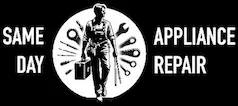Commercial Walk-in Cooler Repair Cost
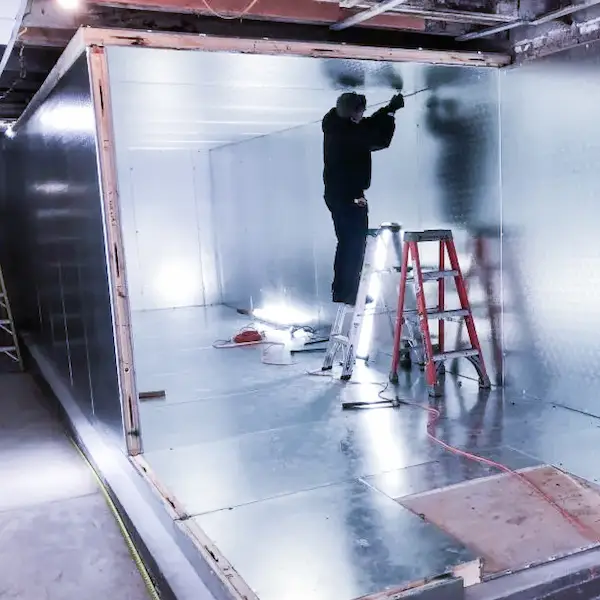
At Same Day Appliance Repair, we are a family-owned business committed to enhancing your customer experience. We understand the frustration of appliance repairs and pride ourselves on our transparency and reliability. This page is created to give you a thorough understanding of our pricing policies, the costs associated with a commercial walk-in cooler repair, and our unique approach to service designed to relieve you of the stress of appliance breakdowns.
We understand the importance of keeping your commercial walk-in cooler units running efficiently without breaking the bank. We offer competitive pricing tailored to your specific repair needs and guarantee transparent cost estimates with no hidden fees, ensuring you feel comfortable about the affordability of our services.
Have Questions? We're Here to Help!
Feel free to call us if you have any questions. Our team is dedicated to helping you and making sure you're happy.
How Much Does It Cost To Repair a Commercial Walk-in Cooler?
The typical cost to repair a commercial walk-in cooler, including parts and labor, varies from $100 to $1200. The price can vary based on the issue type and your appliance's brand and model. Our technician will first need to diagnose the problem to provide you with the most accurate estimate. Following the diagnosis, you'll receive a detailed price breakdown.
Our Pricing Policy For Commercial Walk-in Cooler Repair And How We Work
There are four costs to consider when making your commercial walk-in cooler work optimally.
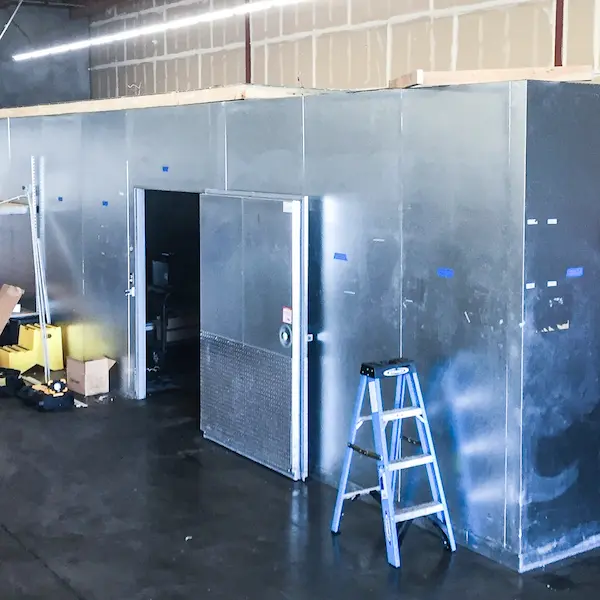
Maintenance Cost
Regular maintenance is essential for your walk-in cooler's longevity and optimal performance. We recommend annual maintenance, which includes cleaning coils and interior surfaces, inspecting and testing door seals, electrical connections, and refrigerant levels, replacing air filters and light bulbs, lubricating fans and motors, and conducting safety checks on control systems and emergency exits, along with more frequent coil inspections, thermostat calibrations, and drain line maintenance in semi-annual visits. Our flat fee for this comprehensive service is $250 for a walk-in cooler.
This preventive approach not only saves you money by reducing the need for repairs but also enhances the efficiency and lifespan of your appliance. Schedule your maintenance appointment with us today and ensure your commercial walk-in cooler runs smoothly.
Service fees
If your commercial walk-in cooler requires repair, we charge a service fee of $80, which includes a detailed price breakdown. This fee is waived if you choose to proceed with the repair. Unlike some companies, we guarantee you will not pay this fee if we cannot diagnose properly. Our technicians are highly trained and equipped with specialized tools to accurately diagnose and resolve issues, ensuring transparency and fairness in our charges.
Labor cost
See prices below. The cost of labor depends on the complexity of the commercial walk-in cooler repair and the estimated time required. We ensure transparency by providing a detailed quote before you commit to the service. Should the repair take longer than expected, you won't be charged extra; we waive the diagnostic fee upon proceeding with the repair, and you will pay the cost of the repair and parts if needed.
Replacement Parts
See prices below. While not every repair needs new parts, certain situations require replacement parts to restore your commercial walk-in cooler to peak performance. Our technicians carry various parts in their vehicles, which usually enables same-day repairs. If a part must be ordered, the cost will vary depending on the repair, brand, and model of your commercial walk-in cooler.
*We always do our best to find parts at a lower price for our customers. We do not make extra money on the parts; our priority is to make it as easy as possible for the customer.
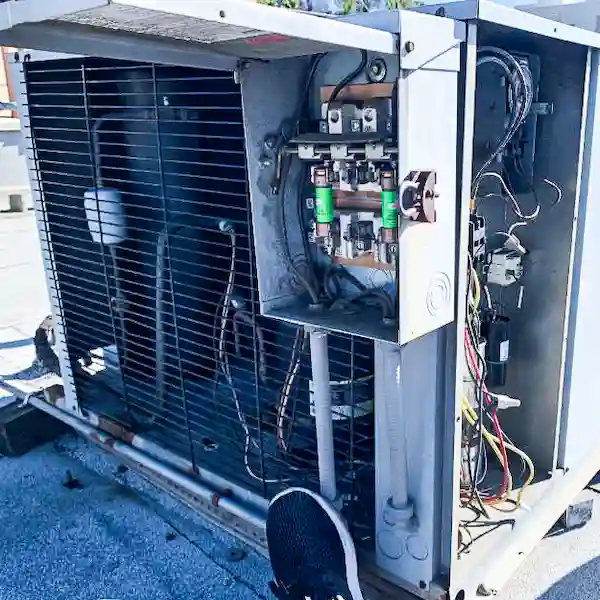
Commercial Walk-in Cooler Repair Cost - Labor Only Excluding Parts
Here are some common problems and price ranges
Increased energy usage, Difficulty maintaining temperature, Frost buildup near door area
Faulty Door Seals Replacement Cost
$100 - $250
Inaccurate temperature control, cooler running continuously or not enough, fluctuating temperatures.
Malfunctioning Thermostat
$150 - $300
Uneven cooling within the cooler, Ice buildup on the evaporator coils, The cooler seems warmer than set temperature.
Defective Evaporator Fan
$100 - $400
Water pooling at the base of the cooler, Ice buildup in the cooler, Musty odors.
Clogged Drain Lines
$80 - $200
System short cycles (turns on and off frequently), Reduced cooling capacity, Hissing noises from the cooler.
Refrigerant Leak
$200 - $500
The cooler does not cool at all, Loud noise or unusual sounds, The compressor doesn't start.
Compressor Failure
$300 - $600
Higher than normal energy consumption, Reduced cooling efficiency, System overheating.
Dirty Condenser Coils
$100 - $300
Commercial Walk-in Cooler Replacement Parts Cost
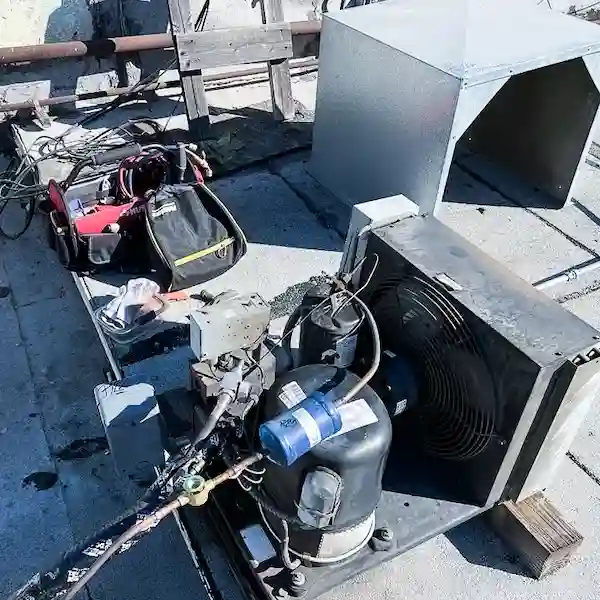
$50 - $150
$100 - $300
Powers the fan that circulates air over the evaporator coils, helping to maintain consistent cooling throughout the interior.
Evaporator Fan Motor
$150 - $400
Prevents the drain line from freezing, which could lead to water backup and potential damage inside the cooler.
Drain Line Heaters
$20 - $1000
$100 - $600
$500 - $1500
These coils release the heat removed from the cooler into the outside air. They are crucial for the efficient operation of the cooling system.
Condenser Coils
$250 - $1000
Hardware for the cooler's door that ensures it opens and closes properly, maintaining an airtight seal.
Door Hinges and Handles
$25 - $200
Cost to Repair a Commercial Walk-in Cooler Depending on the Brand
True Manufacturing
True Manufacturing is known for its high-quality refrigeration units, and their walk-in coolers are no exception. However, the cost to repair a True walk-in cooler can be on the higher end due to the premium components used. For instance, replacing a compressor might cost between $1,200 and $2,500 and labor costs can add another $500 to $1,000 depending on the complexity of the repair. True's advanced technology and proprietary parts often require specialized technicians, which can also contribute to higher service fees. Overall, you might expect to spend between $1,500 and $4,000 for major repairs.
Kolpak
Kolpak is a widely respected brand in the commercial refrigeration industry, known for its durable and reliable walk-in coolers. Repair costs for Kolpak units are generally moderate. A compressor replacement might range from $1,000 to $2,000 and the labor could cost an additional $400 to $800. Kolpak units are designed with ease of maintenance in mind, which can help reduce overall labor costs. The availability of parts is generally good, meaning repairs can be completed more quickly and efficiently, keeping downtime to a minimum. Total repair costs usually fall between $1,200 and $3,500 depending on the specific issue.
Master-Bilt
Master-Bilt is another reputable name in the commercial refrigeration market, offering a range of walk-in cooler models. Repair costs for Master-Bilt units are relatively moderate, with compressor replacements typically costing between $900 and $2,000. Labor costs can range from $300 to $700. The parts for Master-Bilt coolers are generally accessible and reasonably priced, which helps keep overall repair costs down. Given the brand's focus on durability and performance, you can expect to spend between $1,200 and $3,000 on significant repairs.
Norlake
Norlake is well-regarded for producing reliable and efficient walk-in coolers. Repair costs for Norlake units can vary but are often more affordable compared to some premium brands. A compressor replacement might cost between $800 and $1,800 with labor costs ranging from $300 to $600. Norlake's user-friendly design and availability of parts make it easier and quicker for technicians to perform repairs, which can help keep labor costs lower. Overall, major repairs for Norlake walk-in coolers typically range from $1,100 to $2,800.
Bally
Bally Refrigerated Boxes is known for its high-quality, custom-built walk-in coolers. Repairing a Bally unit can be somewhat expensive due to its custom nature and high-quality components. A compressor replacement might range from $1,500 to $2,500 with labor costs adding another $500 to $1,000. The custom parts can sometimes take longer to source and may require specialized installation, which can increase both parts and labor costs. Overall, repairing a Bally walk-in cooler can cost between $2,000 and $4,000 for significant issues.
AmeriKooler
AmeriKooler is a popular choice for many commercial establishments due to its robust and reliable walk-in coolers. Repair costs are generally moderate. A compressor replacement typically costs between $900 and $2,000 with labor costs ranging from $300 to $700. The parts for AmeriKooler units are usually readily available and moderately priced, making repairs relatively straightforward and quick. Overall, you can expect to spend between $1,200 and $3,000 for major repairs on an AmeriKooler walk-in cooler.
These cost estimates can vary depending on the specific model, the nature of the problem, and the region in which you are located. Always consult with a certified technician for accurate diagnostics and cost estimates tailored to your specific situation.
Brands of walk-in cooler we repair
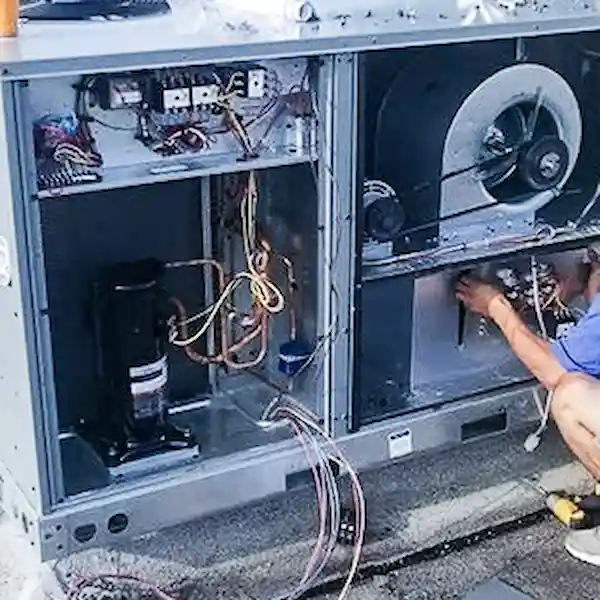
What is Included in the Annual/Semi-annual Commercial Walk-in Cooler Maintenance
Annual Maintenance
- Cleaning
- Removing dirt and debris from evaporator and condenser coils to ensure efficient heat exchange.
- Clearing drain pans and lines to prevent water overflow and mold growth.
- Sanitizing interior surfaces, including walls, floors, and ceilings, to maintain hygiene and prevent contamination.
- Inspecting and Testing
- Checking door seals and hinges for proper sealing and alignment to prevent air leaks.
- Verifying refrigerant levels and looking for signs of leaks to ensure the system is operating efficiently.
- Calibrating the thermostat to maintain correct temperature settings.
- Examining all electrical connections for signs of wear or corrosion and tightening as necessary.
- Replacing
- Changing air filters to maintain air quality and flow.
- Replacing any defective light bulbs and cleaning fixtures to ensure adequate visibility.
- Lubricating
- Applying lubricant to fans and motors to reduce friction and wear.
- Conducting Safety Checks
- Testing control systems and alarms for proper functionality.
- Ensuring that emergency exits are clearly marked and unobstructed.
Semi-annual Maintenance
- Inspecting
- Conducting more frequent inspections of condenser and evaporator coils for any buildup.
- Examining door gaskets for any signs of damage or warping that could impair sealing.
- Monitoring
- Observing fan and motor operation to identify potential issues early.
- Calibrating
- Adjusting the thermostat as needed to ensure it accurately controls the temperature.
- Maintaining
- Keeping drain lines clear to prevent potential blockages and water damage.
Additional Considerations
- Performing Energy Efficiency Audits: Identifying opportunities to reduce energy consumption.
- Reviewing Operational Practices: Adjusting maintenance schedules based on usage patterns.
- Providing Professional Assessments: Offering expert advice on potential upgrades or replacements that might be needed.
By engaging in these practices, a professional technician ensures that the walk-in cooler maintains its performance, safety, and energy efficiency, reducing the likelihood of downtime and costly emergency repairs.
FAQs
Which brands of commercial walk-in coolers do you service?
We service all major brands of walk-in freezers, including
- Norlake
- Kolpak
- KPS Global
- Master Bilt
- Amerikooler
- Thermo Kool
- Commercial Cooling Par Engineering
- Imperial Brown
- International Cold Storage
- U.S. Cooler
- Bally Refrigerated Boxes
- ThermalRite
- American Panel
- Hussmann
- Kysor
- Tyler
and more. If you're looking to install, service, or repair a walk-in cooler, selecting a brand from this esteemed list ensures you are getting a top-quality product. At our service center, we specialize in handling all major brands of walk-in coolers. Whether you need installation, maintenance, or repair services, we have the expertise to assist you. For more information or to schedule a service, please contact us. We are here to help with all your commercial refrigeration needs and more.
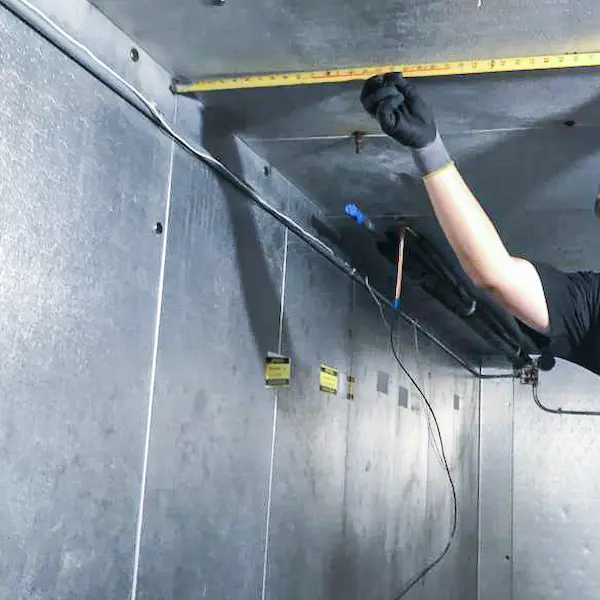
What is the optimal temperature range for a commercial walk-in cooler?
The optimal temperature range typically falls between 35°F and 38°F to ensure proper food safety and quality.
How often should a commercial walk-in cooler be serviced?
Regular maintenance of commercial walk-in coolers is crucial to ensure they are working properly and to avoid costly repairs down the line. On average, it is recommended that these appliances be serviced on a regular basis, typically at least twice a year. Regular servicing includes checking the evaporator coil, door seal, control board, and defrost motor to ensure everything is functioning correctly.
Neglecting regular maintenance can lead to more severe issues like a fuel leak or a malfunctioning drain pan, which can be among the most expensive repairs. For instance, fixing or replacing a compressor or evaporator coil can easily cost a significant amount, pushing repair costs much higher than the average price of preventive maintenance. Additionally, issues like a faulty door seal can lead to increased energy consumption as the cooler works harder to maintain the required temperature, thereby increasing operating costs.
Servicing your walk-in cooler can also help in identifying potential problems that could lead to spoiled food, which is not just a waste but can also affect your business reputation. Moreover, by ensuring that all components, like the freezer door and chest freezers, are fixed before anything goes wrong, you can save on the costs of emergency repairs, which often have a higher hourly rate.
Furthermore, maintaining your walk-in cooler in good condition helps in adhering to the terms of a home warranty or a service warranty provided by the company, which might cover some parts and labor. This can lead to significant cost savings in terms of parts and labor covered under warranty.
In conclusion, investing in regular maintenance for your walk-in cooler not only helps in keeping the appliance in optimal working condition, preventing loud noises or other signs of malfunction, but it also proves cheaper in the long run compared to fixing major breakdowns. Regular check-ups help avoid the most expensive repairs and replace parts like the freezer repair or refrigerator repairs before they exacerbate, ensuring efficiency, longevity, and consistent performance of your cooling unit.
What are the signs that my walk-in cooler needs maintenance?
Recognizing the signs that your walk-in cooler requires maintenance is crucial to ensure its optimal functioning and to save on costly repairs down the line. Here are some key indicators that your unit might need a professional check-up:
- Age of the Unit: Older units typically require more frequent inspections and maintenance. If your walk-in cooler, freezer, or upright freezer is nearing or surpasses the average lifespan for such appliances, it's wise to schedule regular checks.
- Increased Energy Costs: If you notice a spike in your energy bills, it could indicate that your walk-in cooler is not operating efficiently. This inefficiency often results from failing parts that need to be fixed or replaced.
- Inconsistent Temperatures: If the temperature inside your cooler fluctuates or doesn't match the set temperature, this is a direct sign that something is wrong. Inconsistent temperatures can affect food safety and quality.
- Noticeable Frost Build-up or Condensation: Excessive frost or condensation inside your cooler, especially around the door, can indicate a seal problem or issues with the defrost system. This might require freezer repair to ensure the seal is tight and the defrost system is functioning correctly.
- Strange Noises: Hearing unusual sounds coming from your walk-in cooler could be a sign of mechanical issues. Common problems may involve the evaporator or condenser fans. Addressing these promptly can prevent more severe damage.
- Water on the Floor: Water pooling around or inside the cooler can suggest a clogged drain line or other issues that need immediate attention. Leaving this unchecked can lead to slip hazards and structural damage to your floor.
- Slow Recovery Time: If your cooler takes longer than usual to return to the correct temperature after the door has been opened, it may be time for service. This could involve simple adjustments or more detailed repairs to the motor or cooling system.
- Visible Wear and Tear: Regular physical checks can reveal early signs of wear and tear. Addressing these before they develop into major issues can considerably reduce the average cost of repair.
By identifying these signs and securing professional maintenance from a reputable company, you can ensure the longevity and efficiency of your walk-in cooler, freezer, or upright freezer. Remember, preventative maintenance is often more cost-effective than emergency repairs, especially considering the national average for freezer repair costs. Early intervention can fix minor issues before they escalate into more significant, expensive repairs, helping to maintain the safety and functionality of your cooling equipment.
Can I perform maintenance tasks on my walk-in cooler myself?
Basic tasks like cleaning and checking door seals can be done in-house, but more complex tasks such as checking refrigerant levels or electrical components should be handled by a professional.
What should I do if my walk-in cooler is not maintaining temperature?
Check for obvious issues like door not sealing properly or dirty condenser coils. If these are fine, contact a professional technician to inspect the refrigeration system.
How can I improve the energy efficiency of my walk-in cooler?
Ensure regular maintenance, use energy-efficient lighting, install strip curtains, and consider upgrading insulation or cooling components.
What is the life expectancy of a commercial walk-in cooler?
With proper maintenance, commercial walk-in coolers can last 15 years or more, depending on the usage and quality of installation.
How do I choose the right size walk-in cooler for my business?
Consider your storage needs, available space, and budget. Consulting with a refrigeration expert or contractor to get a tailored solution is advisable.
What are common problems with walk-in cooler doors?
Common problems with walk-in cooler doors, which function similarly to large-scale refrigerator and freezer units, often stem from wear and tear due to age and frequent usage. These issues can be particularly vexing for businesses that rely on them, such as restaurants and grocery stores, where maintaining optimal temperature is crucial for preserving food safety and quality.
One common issue is the misalignment of the door due to settling of the floor or frame, which can lead to improper sealing. This not only compromises the efficiency of the cooler but also leads to increased energy costs as the unit works harder to maintain the required temperature. Addressing this promptly can save the company on energy bills and prevent further damage.
Another frequent problem is the deterioration of door seals or gaskets. Over time, these can become brittle or cracked, again leading to poor sealing and excess energy consumption. Fixing or replacing these seals is generally an affordable repair, significantly less than the average cost of more extensive freezer repairs or buying a new upright freezer.
Problems with the door hinges and handles can also occur, which may prevent the door from closing properly or make it difficult to use. These issues can typically be resolved within an hour or so by a repair service, keeping the downtime to a minimum.
Lastly, the buildup of ice around the door frame, particularly in freezer sections, can indicate issues with the door's functionality or the cooling system itself. Regular maintenance checks can help identify and fix these problems before they escalate into major freezer repairs.
By addressing these issues promptly and maintaining regular checks, businesses can extend the life of their walk-in coolers and freezers, ensuring they operate efficiently and effectively.
Can a walk-in cooler be moved or expanded after installation?
Yes, but this should be done with professional help to ensure the integrity of the structure and refrigeration system is maintained.
How do I know if my commercial walk-in cooler can be repaired or if it's time to replace it?
Determining whether your commercial walk-in cooler, which functions similarly to both a refrigerator and a freezer, requires a simple fix or a complete replacement involves several considerations. Firstly, assess the age and overall condition of the unit. If your refrigerator or freezer is frequently breaking down, necessitating multiple freezer repairs each year, it might be more cost-effective in the long run to consider replacement rather than continuous repairs.
Look at the performance of your freezer. If you notice that the freezer is not maintaining the proper temperature consistently, or if there are signs of excessive energy consumption, these could be indicators that the freezer's efficiency is declining. A freezer repair might resolve these issues temporarily, but if such problems persist, replacement might be necessary.
The frequency and cost of past repairs can also guide your decision. If you're calling in a technician every other month to fix the freezer and the bills are steadily climbing, these repairs might no longer be justifiable. Especially if the freezer is approaching the end of its expected lifespan, investing in a new freezer can be more economical considering the advancements in energy efficiency and reliability in newer models.
Another factor to consider is the availability of parts. An older freezer and refrigerator might have components that are difficult or expensive to source, making freezer repair not only more costly but also more time-consuming. If you find that parts for your freezer are becoming scarce, this might be a strong indicator that it's time to update to a newer model.
Calculate downtime as well. Each hour that your refrigerator or freezer is not functioning correctly can mean lost revenue, especially in a commercial setting. If freezer repairs are causing significant downtime or if the freezers cannot reliably meet the demands of your operation, replacing it might be necessary to ensure business continuity.
Lastly, consult with a professional who specializes in commercial freezers and refrigerators. They can provide a detailed assessment of your unit's condition and efficiency, and recommend whether a fix is sufficient or if a full replacement is advisable. Their expertise can help you weigh the costs of ongoing freezer repairs against the investment in a new, more efficient model.
